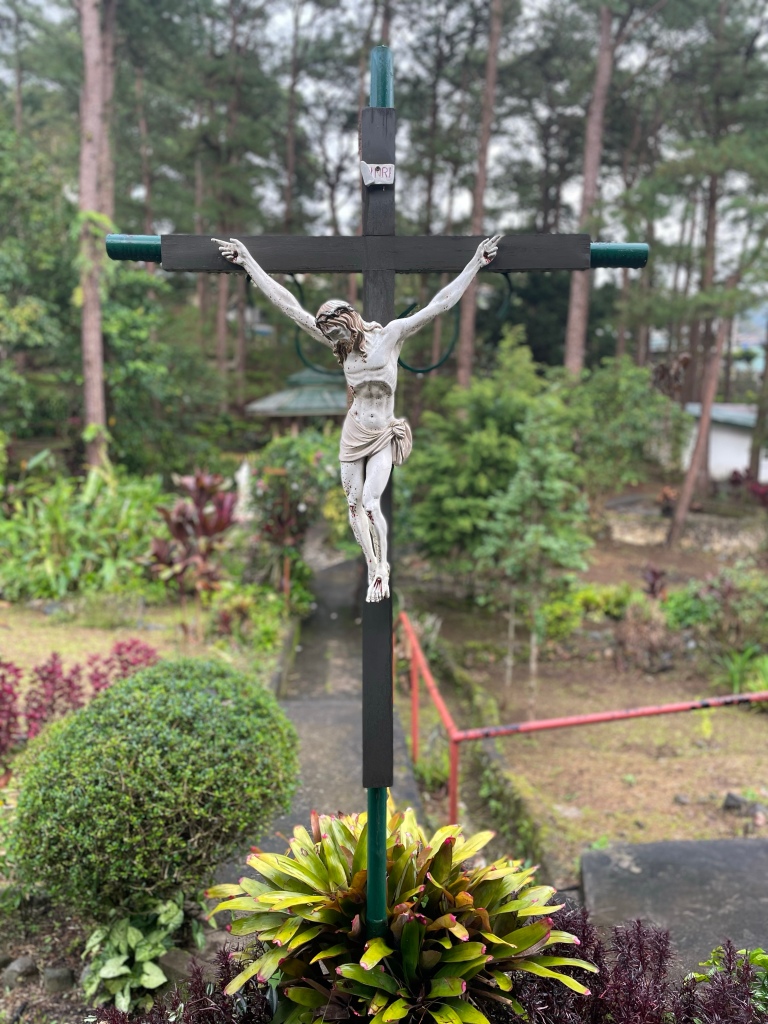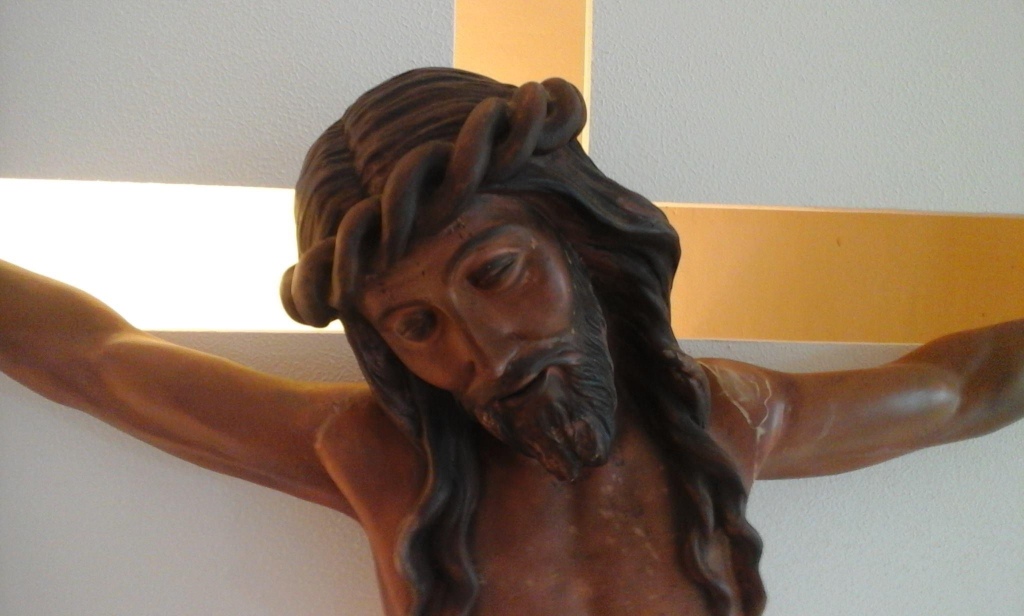976 total views
The Lord Is My Chef Sunday Recipe for the Soul by Fr. Nicanor F. Lalog II Sunday in the Twenty-Second Week of Ordinary Time, Cycle A, 03 September 2023 Jeremiah 20:7-9 ><}}}}*> Romans 12:1-2 ><}}}}*> Matthew 16:21-27

Afriend serving as a nun in California recently sent me a wooden cross and a wooden rosary as her delayed gifts for my birthday and anniversary last summer. Tied to the wooden cross is a card that asks, “Why do people cross the road?” Answer: “To get to the side of life!”
So beautiful and true! To get to the side of life we must cross the road in Jesus Christ with his Cross!
That is the gist of our gospel this Sunday which is still set in Caesarea Philippi where Jesus for the first time revealed himself as the Messiah following Peter’s identification of him as “You are the Christ, the Son of the living God” (Mt.16:16) last week. It was also at that same scene this Sunday when Jesus predicted for the first time his coming Passion, Death, and Resurrection that scandalized his apostles, especially Peter.
Jesus began to show his disciples that he must go to Jerusalem and suffer greatly from the elders, the chief priests, and the scribes, and be killed and on the third day be raised. Then Peter took Jesus aside and began to rebuke him, “God forbid, Lord! No such thing shall ever happen to you.” He turned and said to Peter, “Get behind me, Satan! You are an obstacle to me. You are thinking not as God does, but as human beings do.”
Matthew 16:21-23

During the time of Jesus, the cross was the most inhuman punishment of all. It was the worst curse that could fall on anyone that it was a crime in Roman law to threaten anyone with crucifixion. Its horror was strongly etched on the people’s minds at that time.
That is why Peter reacted in such a way to the Lord’s first prediction of his pasch. However, it is totally opposite with us today as we see the cross displayed everywhere. Not only in churches, cemeteries and homes but even in offices, classrooms, hospitals, restaurants, and in all kinds of vehicles. We have cross in our pockets and wallets, on our shirts and jewelries with some on their skin as objects of veneration or as a badge. But, do we really understand and realize the deeper meaning of the cross?
If we admit so readily that Christ must suffer his passion, it is most likely that we have not truly dwelled on this scandalous reality unlike Peter and people of his time. And that is the danger of this too much use of the cross by so many without even reflecting on its true meaning except, perhaps, only once a year on Good Friday.

Beginning this Sunday, Jesus invites us to look more intently to his cross when we listen to the word and celebrate the Eucharist.
There at Caesarea Philippi, Jesus and the Twelve went on a u-turn to head down south towards Jerusalem to fulfill his mission. We too must cross the road – make u-turns if needed to follow Jesus by thinking in God’s thoughts not in human thoughts for us to forget ourselves, take our cross and follow Jesus.
Jesus must have understood the humanness of Peter in reacting in such a way after making his first prediction of his Passion, Death and Resurrection. But, see how the words of Jesus to Peter at Caesarea were so identical with his very words to the devil during his temptation in the wilderness, He turned and said to Peter, “Get behind me, Satan! You are an obstacle to me. You are thinking not as God does, but as human beings do.”
Jesus reminded Peter and us today to think in God’s ways not in human thoughts. Like Peter, we are fully human, so limited, so weak. We are in the world and many times, the temptations to be of the world are so strong even in subtle ways we are not aware of, wrongly thinking like Peter that we are doing Jesus a great service when it is not.
It is the same temptations we also go through daily like Peter when one day we are so highly inspired with revelations from God in our prayers and experiences then suddenly, we feel low and lost, afraid and terrified with the realities of the Lord’s call and way of his Cross.
This is what Jesus is telling us in this final scene at Caesarea Philippi – of the need for us to confront daily the scandal of his Cross, of his suffering and death leading to his glorious resurrection. It is a process of crossing daily the street in Jesus with his Cross by thinking in God’s thoughts, not in human thoughts.
To think as human beings do is to think of one’s self more, to think of one’s own good and glory, totally forgetting others and most of all, neglecting even rejecting the higher things in life like God and virtues and other things that the material world cannot fill. To think as human beings do is to think more of success and accomplishments, happiness and pleasures; to think as God is to think of fruitfulness and fulfillment, of joy and completeness, of sacrifice and sufferings, of love and mercy.
Like Peter, there were times we have denied knowing the Lord but what matters most is we realize our sins and go back to him. Like Peter, many times we do not listen intently to the Lord’s words, always forgetting or ignoring his resurrection that when Easter happened, we are also troubled and amazed when we could not find him. Many times we are like Peter we think as humans forgetting to think like God when we are so filled with ourselves. Let us pray and be patient in our prayer life, in emptying ourselves like Peter so that like him when Pentecost came and was filled with the Holy Spirit along with the other disciples, everything became clear with the bold proclamation that “God has made him both Lord and Messiah, this Jesus whom you crucified” (Acts 2:36).

Many times in life, it is so difficult to think in God’s ways because of this great temptation that we think something better and easier like what the devil told Jesus in the wilderness of turning stones into bread to solve his hunger. We find it very appealing to deviate from the plans of God, not to follow his thoughts because they always require patient waiting and most of all, the need to consider and respect others too, especially those in the margins.
That has always been the temptation by the devil to Jesus and to us – to just forget God and his plans, to go on with the flow of tide, with the ways of the world of wealth, power and fame, to choose what is easier and more pleasurable, what is most appealing to the senses that give instant gratifications.
And thus we have these problems and crises even in faith because we have rushed and simplified even the sacred and holy! Anything goes in the Mass, especially with priests on the pretenses of being more inclusive, more understanding to the people, of just being so plainly simplistic from architecture and designs to vestments and clothings. Homilies are more of clapping and singing and theatrics; God’s thoughts are disregarded, human thoughts are emphasized when pastors please their congregation with all kinds of healing and “hiling” – the health and wealth type of preaching. We have forgotten the fact that people go to Mass to experience God and his thoughts – not human politics and other agenda nor entertainment.

This Sunday, the prophet Jeremiah shows us how despite our own limitations and weaknesses, we can still think in God’s thoughts by allowing ourselves to be taken over by God “like fire burning in my heart, imprisoned in my bones” (Jer. 20:9) to be “duped” by God because that is where we still find life amid death and sufferings. In short, fall in love and stay in love with God! That is what St. Paul meant in the Second Reading urging us “to offer your bodies as a living sacrifice, holy and pleasing to God” (Rom. 12:1) by living, thinking and doing the Father’s will always. It is a process that takes time. Be patient for our God is the most patient lover of all. Amen. Have a blessed week, stay safe!















